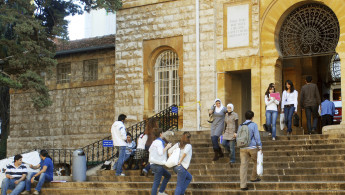Lebanese creativity pushed by startup awards and competitions
Heatechs provides a solution for heating and cooling using renewable energy with advanced material to manufacture blankets for refugees. It offers a clean and safe solution for heating at a fraction of the cost and without the risk of uncontrolled heating from stoves.
The four students, studying mechatronics engineering at RHU, won US $250,000 with the Hult Prize Lebanon – a country wide on-campus platform for students that supports them to solve real world problems through launching businesses while still in university.
"One of the most important things to remember is that we don't identify new businesses, rather we help create them, providing a much-needed boost to the local ecosystem," Karim Samra, accelerator lead and chief operating officer of the Hult Prize Foundation, told The New Arab.
"We also run the Changemaker Festival, which seeks to inspire, educate, and connect university students with their peers and role models to encourage dialogue and partnerships that lead to impact. This year, in its first Middle East edition, the festival saw 5,000 attendees from more than 20 Lebanese cities, trained more than 900 students, and hosted 25 CEOs from within and outside of Lebanon."
 |
Necessary and positive, social enterprises can bring employment and make a change in a country facing multiple environmental, social and economic crisis |  |
The initiative is seen as a positive step for young Lebanese people who often have ideas but don't know how to develop them into a business.
"As we look back to how we used to think before the accelerator and after it, we realised how inspired and influenced we were from every coach, mentor, participant who joined us," Rawan Ghailany, one of Heatechs' team members, told The New Arab.
"Although we passed through a tough and stressful time, it is nothing compared to the skills and knowledge the experience has offered us. Upon reaching the accelerator and with the help of mentors, we pivoted the idea into what we believed is more impactful and closer to the market. Heatechs today is totally what we wanted to offer as our part in leaving an impact and saving lives of whoever faces the risks of night conditioning."
Marie-José Daoud, co-founder of the media and communication startup Labneh&Facts, tells The New Arab that there have been social enterprises for 40 years in Lebanon.
"Although it's not defined yet in Lebanon, there has been a kind of gush of new social enterprises. I think it's connected to the garbage crisis. People really saw the government doesn't do anything, deciding it is up to them to do something and that it is not possible to delegate everything to NGOs."
Read also: 'This is discrimination': Disabled children are 'being robbed of an education' in Lebanon
In response to these new needs and wills, initiatives have grown to help them, according to Labneh&Facts other co-founder Soraya Hamdan.
"Globally, several accelerators funds are being created because investors have more interests in social outcomes. Consumers also expect more from a company than a product, they want purpose. All that plus the crisis in Lebanon have led to the development of social enterprises."
In Lebanon, Agrytech is an accelerator while Viridis investment fund and Alfanar intervene for growing ideas.
Alfanar, meaning "beacon" in Arabic, is a venture philanthropy organisation providing funding, management support, training and mentorship to social enterprises that are focused on education, job creation and women's economic empowerment.
 |
People really saw the government doesn't do anything, deciding it is up to them to do something and that it is not possible to delegate everything to NGOs |  |
"We provide growth stage social enterprises with grants and repayable grants up to US $400,000 over a period of 4-5 years along with mentorship, management support, introductions to our networks and training," country director Michelle Mouracade told The New Arab.
"We support an entire organisation as opposed to individual business processes and we commit to supporting them over the long term, as long as they are able to meet their growth targets. The organisations are usually early to growth stage. Specifically, they need to be registered, to have proven their business and impact model, to have a strong management team and the potential to scale at the national, regional and even international level."
Mouracade believes that "Lebanese people have the entrepreneurial gene in their DNA and are incredibly creative and courageous," but pointed out that "the survival of these businesses is even more precarious than usual due to the smaller purchasing power of consumers and the dramatic lack of post-seed funding".
Read also: 'Social explosion' threatens Lebanon's hard-won peace
An opinion shared by Omar Itani, co-founder of social enterprise FabricAID, that collects, sorts and resells second-hand clothes at a minimum price, told The New Arab that the country needs more incubators but also accelerators, in order to scale up and grow after the company's ecosystem development.
"It's becoming more stable, but we need more players," Itani said. "We also need to teach entrepreneurship more in schools, show young people they can have success not only through working with big companies in the Gulf."
 |
We also need to teach entrepreneurship more in schools, show young people they can have success not only through working with big companies in the Gulf |  |
FabricAID grew through winning 15 local, regional and international startups competitions, including the Global Social Venture Competition in March, which gave them "a lot of money and exposure as well as a strong network".
Necessary and positive, social enterprises can bring employment and make a change in a country facing multiple environmental, social and economic crisis. But startups focused on helping young people need more investment and trust to grow and stabilise their activities to maintain real efficiency and impact.
Florence Massena is a freelance journalist based in Lebanon, where she reports on the region with a focus on the environment, women's issues, refugees and humanitarian initiatives.
Follow her on Twitter: @FlorenceMassena



